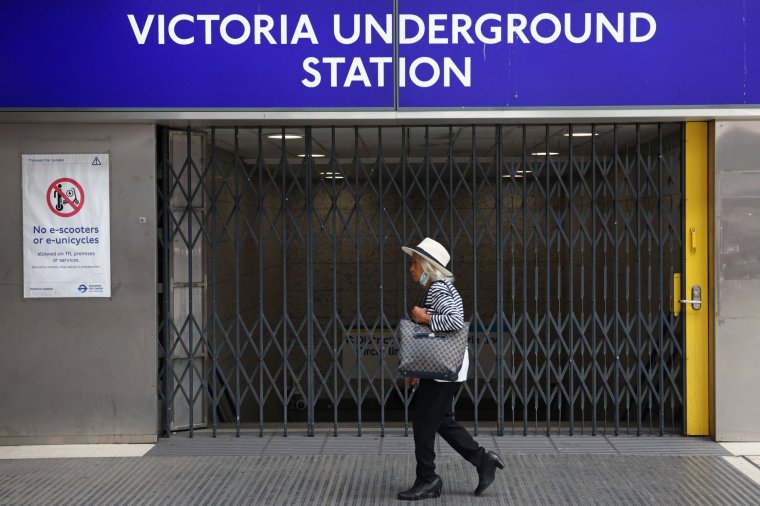Passengers are set for travel misery across the UK as train drivers at 16 rail companies and the London Underground have planned new coinciding strike action.
Tube drivers are to stage two 24-hour strikes on 8 April and 4 May, in a long-running dispute over terms and conditions.
The Aslef strike hits both the Easter school holidays and the first May bank holiday weekend.
Members of Aslef on the railways will also hold a rolling programme of one-day walkouts between 5-8 April, coupled with a six-day ban on overtime.
Drivers will strike on Friday April 5 at Avanti West Coast, East Midlands Railway, West Midlands Trains, and CrossCountry, on Saturday April 6 at Chiltern, GWR, LNER, Northern, and TransPennine, and on Monday April 8 at c2c, Greater Anglia, GTR Great Northern Thameslink, Southeastern, Southern/Gatwick Express, South Western Railway main line and depot drivers, and SWR Island Line.
Members will also refuse to work their rest days from Thursday April 4 to Saturday 6 April and from Monday 8 to Tuesday 9 April.
Finn Brennan, Aslef’s organiser on London Underground, said the company had failed to give assurances that changes to terms and conditions will not be imposed without agreement.
He said: “Despite a previous commitment to withdraw plans for massive changes to drivers’ working conditions, London Underground management has established a full-time team of managers preparing to impose their plans.

“They want drivers to work longer shifts, spending up to 25 per cent more time in the cab, and to remove all current working agreements in the name of flexibility and efficiency.
“Everyone knows what these management buzz words really mean. It’s about getting people to work harder and longer for less.”
Aslef general secretary, Mick Whelan, said: “Last month, when we announced renewed mandates for industrial action, because under the Tories’ draconian anti-union laws we have to ballot our members every six months, we called on the train companies, and the Government, to come to the table for meaningful talks to negotiate a new pay deal for train drivers who have not had an increase in salary since 2019.
“Our members voted overwhelmingly – yet again – for strike action.
“Those votes show a clear rejection by train drivers of the ridiculous offer put to us in April last year by the Rail Delivery Group (RDG) which knew that offer would be rejected because a land grab for all the terms and conditions we have negotiated over the years would never be accepted by our members.”
Aslef drivers who work on the Tube voted by 98 per cent in favour of strikes, on a turnout of 70 per cent.
This will be the second time members of Aslef have walked out over the same dispute, after going on strike on 15 March, 2023.
A Rail Delivery Group spokesperson said: “Nobody wins when industrial action impacts people’s lives and livelihoods, and we will work hard to minimise any disruption to our passengers.
“We want to resolve this dispute, but the Aslef leadership need to recognise that hard-pressed taxpayers are continuing to contribute an extra £54 million a week just to keep services running post-Covid.
“We continue to seek an agreement with the Aslef leadership and remain open to talks to find a solution to this dispute.”
Transport for London (TfL), which is responsible for the London Underground service, said it has been in long-term discussions with the trade union on how to modernise procedures and processes on to improve the experience both for staff and customers.
A TfL spokesperson said: “We have no plans to impose these changes and have committed to no one losing their job as part of these changes, and we have engaged with our unions to demonstrate that no change will be made that compromises our steadfast commitment to safety on the Tube network.
“We urge Aslef to continue discussions with us so that disruption for Londoners can be averted.”
While a spokesman for the London Mayor Sadiq Khan said: “Strikes are bad news for everyone and the Mayor urges ASLEF and TfL to continue talks to find a resolution to this dispute, and prevent this potential disruption to Londoners.”
The Tube strike is not expected to include the Elizabeth Line, Docklands Light Railway or London Overground, although these lines will become busier than normal.
Tube staff belonging to the RMT union were due to walk out in January this year but the strike was called off at the last-minute, avoiding four days of disruption.
These latest Tube strikes come as staff on TfL’s tram service are also planning industrial action in March, May and July.
If the strikes go ahead, tram services will be disrupted from 8pm Sunday 24 March to 6am Thursday 28 March, from 8pm Sunday 5 May to 6am Thursday 9 May, and from 8pm Thursday 11 July to 6am Monday 15 July.
A Department for Transport spokesperson said: “ASLEF is the only rail union continuing to strike, targeting passengers and preventing their own members from voting on the pay offer that remains on the table.
“Having resolved disputes with all other rail unions, the Transport Secretary and Rail Minister have ensured that a pay offer is on the table – taking train drivers’ average salaries from £60,000 up to £65,000.”

